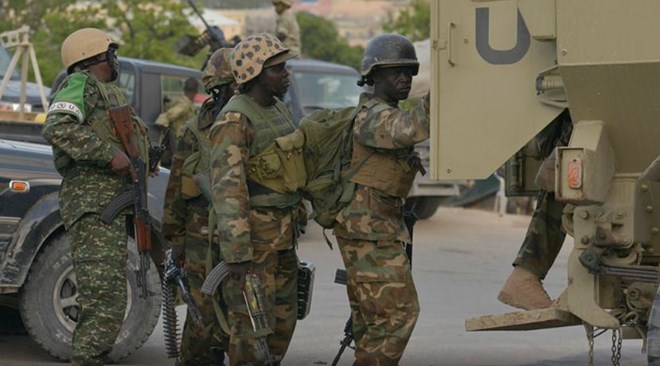CHIMPREPORTS
Wednesday October 3, 2018

Uganda is experiencing ‘relative quiet’ and remains less vulnerable to Al Shabaab extremism attacks compared to her East African neighbors, Kenya and Tanzania – a new report has revealed.
The Somali-based terrorist group has not launched a successful assault in the country since coordinated July 2010 bombings in Kampala killed 74.
Crisis Group said in a report seen by ChimpReports this week that there is no obvious constituency among indigenous Muslims from which militants can recruit.
Muslims make up about 14 per cent of Uganda’s population.
“Most are well integrated and inter-confessional relations are relatively good, with inter-marriage between Christians and Muslims quite common.
Although Muslims have similar grievances to their co-religionists in Kenya and Tanzania, notably state neglect and lower access to formal education, Muslim elites in Uganda are relatively successful in business; they dominate the hospitality and transport industries, among other sectors,” the report reads in part.
According to Hajj Nsereko Mutumba, spokesperson of the Uganda Muslim Supreme Council: “We historically did not have sufficient access to the education system but we focused on business and have done well”.
The International Crisis Group describes itself as an independent organisation working to prevent wars and shape policies that will build a more peaceful world.
Secondly, the Crisis Group researchers discovered, Uganda has better integrated its Somali population than neighbours such as Kenya, thus making them less susceptible to militant recruitment.
The ethnic Somali population in Kampala is divided into two groups: those who have lived in Uganda for decades, and speak local languages, and more recent arrivals.
The first cohort is well integrated and prominent in commerce, particularly in the transportation and logistics businesses.
The second is less well assimilated; donors and local NGOs focus support on them.
A likely third factor, according to Crisis Group, is the Ugandan security forces’ close cooperation with Western intelligence agencies, which began soon after the 2010 Kampala attack.
Ugandan security officials assert that shared intelligence helped thwart attacks, including a September 2014 plot to hit bars, a hotel and a university.
“Despite this relative success, the Museveni administration’s policies and the security forces’ practices could yet drive young Muslims toward militancy,” the group observed.
Arrests
“Indiscriminate arrests of Muslims every time a high-profile crime occurs are an acute source of grievance.”
In 2012, amid a rising crime wave, Ugandan authorities rounded up dozens of Muslims, creating significant resentment among their co-religionists.
The same has happened after other high-profile crimes, including the November 2016 shooting of police Major Mohammed Kiggundu and the April 2018 killing of businesswoman Susan Magara.
Following a public outcry, the most prominent detention centre where suspects were detained, the Nalufenya police station, was temporarily closed in April 2018 and suspects transferred to other stations after pictures emerged of several of them bearing serious wounds on their bodies, thought to be due to torture.
Police chief Martin Okoth Ochola, who replaced the long-serving Kale Kayihura in March 2018, promised to end the practice of torture in detention. According to one cleric, many Muslims are living with wounds on their bodies and in their hearts due to the indiscriminate arrest and torture of Muslims.
An unexplained spate of murders of Muslim clerics has heightened the alarm. Since 2012, several imams have been killed across Uganda, usually by assailants on motorbikes.
The government has blamed intra-Muslim wrangling and ADF for the killings, an explanation dismissed by clerics who blame the authorities.
In sum, said Crisis Group, Uganda has “done better than its neighbours in thwarting large-scale attacks, related in part to intelligence cooperation with the West but also to its better integration of Muslims, its amicable inter-confessional relations and its lack of a ready constituency from which militants can draw support.”
“In this sense, policies that alienate Muslims are likely to prove self-defeating. In particular, authorities should avoid scapegoating Muslims every time a prominent person is killed.”